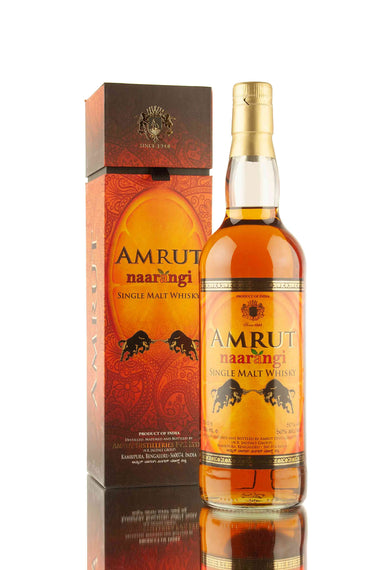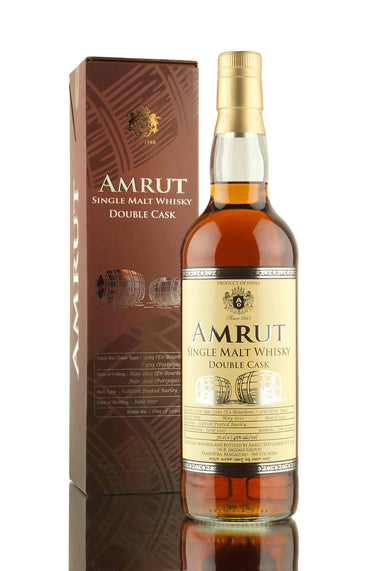
Amrut Naarangi
Naarangi, a rather intriguing new expression from Amrut distillery, released in 2017. Firstly the distillery have taken an Oloroso cask from Spain,...
View full details
Amrut has a history stretching back to 1948 and producing Indian spirit based products for an eager local market. Originally established as Amrut Laboratories by Shri Radhakrishna, the firm was...
Amrut has a history stretching back to 1948 and producing Indian spirit based products for an eager local market. Originally established as Amrut Laboratories by Shri Radhakrishna, the firm was a jack of all trades based in Bangalore supplying Indian Made Liquor to the native armed forces – which continues to this day - having initially started from humble beginnings.
The growth of the company from its modest inception was partially assisted by the modernising of Indian laws around alcohol. It was the start of a widespread shift along with a change in consumer tastes with more rugged styles of spirit being dismissed in favour of a more refined and flavoursome product. Fuelled by a rise in living standards and wages, Indian consumers were demanding a better style of alcohol. Silver Cup Brandy in 1949 was an initial attempt to tap into this growing demand. To this day Amrut supplies a wide variety of alcohol styles to the mass market with single malts forming a small part of its current portfolio that also features gin, rum and vodka.
Focusing on whisky, the company decided in 1982 to adopt a more Scottish approach by using barley rather than the more locally preferred method of molasses. This involved locally grown barley prior to distilling the spirit. The end result was released less than 2 years later as MaQintosh Premium Whisky. The Indian market at this time was full of imaginative brands that had suggested Scottish origins, but in the case of MaQintosh it was merely a blend with a large percentage of its contents coming from sugarcane distilled alcohol. The brand continues to this day but has thankfully been refined and now consists of Scottish and Indian malted whisky that has been vatted together in imported oak barrels.
Gaining valuable experience and confidence whilst seeking Scottish expertise, Amurt decided to launch its own single malt whisky in 2004 internationally. The Amrut was the first single malt whisky of its kind from India and was a no age statement release however it’s worth remembering that due to climate conditions in the country, maturation is accelerated almost 3-fold due to evaporation. This continues to force Amrut to bottle at younger ages otherwise the character of the whisky would become wood dominated and drop below an acceptable alcoholic strength. Today, Amrut is an established presence on the international scene having won several awards.
A reflection of this is the expanded range of whiskies it offers that feature barley grown in the foothills of the Himalayas. A major award recipient is the Amrut Fusion that takes its inspiration from the use of local and Scottish barley to create a distinctive whisky whilst the Amrut single malt features 100% locally grown barley. A particular favourite amongst friends is always the Double Cask range that currently features ex-bourbon and port casks to create a rather lavish experience. There remains a degree of experimentation with the Naarangi being given an orange taint due to the casks maturing wine, sherry and orange peel for 3 years before adding a 3 year old malt for a further – yes you’ve guessed it – 3 years. Also on the market is a peated variant bottled at cask strength and a mid-range 23ppm on the peat level scale. Worth looking out for are the releases dubbed the Greedy Angels that are exceptionally aged – by Indian standards – whiskies with the oldest being 12 years old.
The distillery itself in Bangalore only produces around 200,000 litres annually which is a small amount by Scottish standards. Just 2 stills produce the spirit that makes up the Amrut range although there are plans afoot to expand the site due to increased sales and enthusiasm for Indian whisky. With a growing presence and now independent bottlings available Amrut looks to continue its success.
 Sale
Sale
Naarangi, a rather intriguing new expression from Amrut distillery, released in 2017. Firstly the distillery have taken an Oloroso cask from Spain,...
View full details Sale
Sale
The Double Cask series from Amrut distillery continues with this, the 3rd release. Two casks combined once again, an ex-bourbon cask (#3189) and a ...
View full details
